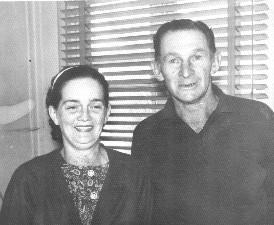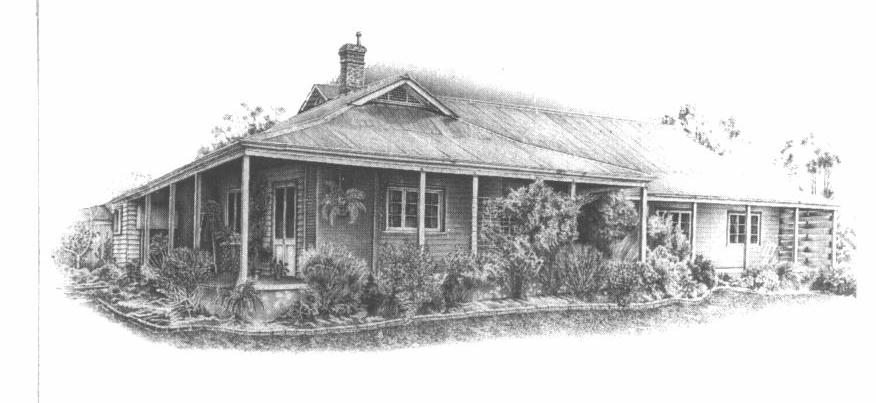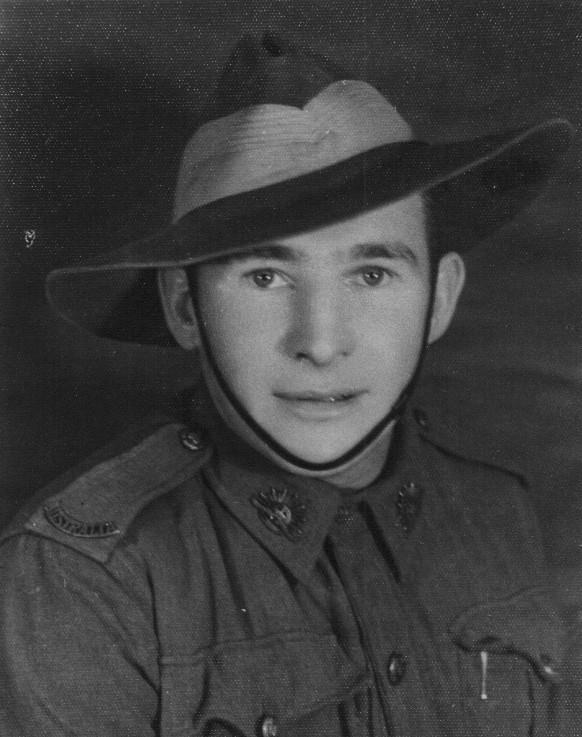|
Margaret (Peggy) Evelyn Brown was born on 27 August 1927 in Yalgoo, Western Australia, to parents Lin dsay George and Margaret Ellen (Nell) Brown (nee McGlenchy). Peggy married Alan Gardiner TOOVEY and they went on to have nine children. Alan was born on 16 October 1918 in Subiaco WA to parents Lomas (Lowrie) George and Emily Charlotte Toovey (nee Gardiner). dsay George and Margaret Ellen (Nell) Brown (nee McGlenchy). Peggy married Alan Gardiner TOOVEY and they went on to have nine children. Alan was born on 16 October 1918 in Subiaco WA to parents Lomas (Lowrie) George and Emily Charlotte Toovey (nee Gardiner).
Alan joined the army at age 22 from 3/3/1940 - 6/4/1946. He fought in the Middle East, Egypt, N Africa and New Guinea. He traveled to the war on the "SS Arjula" which was captured from the Germans in WWI. He was a part of "The Rats of Tobruk"
It was during leave from the war, where he met Margaret Evelyn Brown. They married on 31 March 1944. When Alan returned from the war they lived in Mt Barker. He had numerous jobs, and he owned his own dairy farm for 9 years out at Forest Hill. Alan and Peggy then moved into town. He finished his employment working at the Mt Barker abattoirs.
Aunt Peggy and Uncle Alan kindly took my brothers and I in to live with their family at their dairy farm at Mount Barker after our parent's marriage broke up. Their farm was some miles out of Mount Barker on the Rocky Gully Road. Their older children were about our age and we got on very well. Alan and Peggy Toovey worked very hard running dairy cattle and the children were expected to do their chores. They weren't particularly difficult and included feeding the chooks and helping to clean out the dairy. The two jobs I hated were getting up before dawn each day to help Uncle Alan round up the cows for milking. Also, once a week, we would all have to help Aunt Peggy operate her new fangled¯ washing machine. We had no electricity on the farm and the machine worked by yanking up and down on a lever at the base of the bowl.
 |
The Old Toovey Farmhouse
We found life very enjoyable on the farm. There were sheep, cattle and horses to keep our interest. I enjoyed the opportunity to drive the tractor and helped our uncle with the ploughing and harvesting. Uncle Alan killed his own sheep to keep the family in meat. He had a killing Tree¯ towards the dairy, not far from the house. It was set up with a rope and pulley to hoist the dead animal upside down to skin and gut it. My brothers and I found it all rather fascinating but I usually looked away when my Uncle made the killing strike across its neck. The first time my brothers and I were watching Uncle kill a sheep he was being helped by Dad. After the sheep's throat was slit and the blood had finished pouring out into the grass Alan turned to us boys, sharpening the blade of the knife and asked, who's next? We all ran in terror for the house and took some coaxing to come out again.
We went to the state school at Mount Barker and caught the school bus each morning and afternoon. Mount Barker enjoyed a very high rainfall and nothing gave us greater pleasure than those wet mornings when the school bus never turned up at our farm gate because of the condition of the roads and we would have the day off. The weekends were fun. Every Saturday Uncle and Aunty would go into town to the pub for a few drinks. They usually went to the hotel on the corner of the main street opposite the large Co-Operative Building. We often went with them and enjoyed glasses of cool drink. Having time on our hands, we found that we could easily get through the old fence of the Co-Operative which is where all the apples and pears from outlying orchards were brought in for processing and packed into crates ready for market. We had noticed a large stockpile of boxes of apples that were seconds and they appeared to be only slightly bruised. We children found a ready market for them at the pubs and sold them for just a few shillings a box. It was a good feeling having a little money in our pockets and we didn’t think too hard on the morality of our actions, or those of the adults who readily brought them.
Maureen Herbert's Parents, Pat & Beatie, at the Show with Peggy & Alan Toovey
On occasions we children were left at home while the adults went to town. We’d almost certainly get up to mischief in their absence. Like the time when it was very hot! The farmhouse was serviced by a number of large rainwater tanks and they were all full. We levered the inspection lid off one and looked in to see the cool and inviting water and all took turns to dive in from the top of the tank. The water was very deep and we were out of our depth. The only light entering the tank came through the open lid. It was my turn again to dive in and I came out of the water over the far side of the tank. The tank was almost full and only by turning your head on one side could you get your nose above the waterline to breathe. All of a sudden, with a loud metal clang, I was pitched into complete darkness.
In the absolute pitch black I screamed to no avail. I then started to make my way to where I thought the lid would be, but as I frantically felt for the lid with my hands whilst madly treading water, I couldn’t find it anywhere. I had started to panic when the tank was suddenly lit with bright light again. The other children had opened the lid and bolted into the distant paddocks. I was so pleased to get out of the tank and we never swam in it again.
Margaret (Peggy) Evelyn Toovey died in Mt. Barker WA on 26 December 1981, she was 54, and is buried at Karrakatta Cemetery. Alan Gardiner Toovey died in Basendean WA on 22 November 2000 at the age of 82. He was cremated at Karrakatta Cemetery.
They had the following children:
Lorraine Patricia (1945-)
Alexie Faye (FAYE) (1946-)
Robert John (Johnny) (1948-)
Karin Rae. Born on 23 Dec 1950. Karin died on 6 Aug 1960 at age 9.
Linda Gayl (1953-)
David Alan. Born on 17 Apr 1957.
Wayne Mark (1961-)
Raelene Joy (1965-)
Shane Richard. Born in Nov 1969. Died in Nov 1969.
The following Eulogy was written and spoken by Molly Jones, Alan’s youngest sister, at Alan’s Funeral.
First I would like to thank the family for giving me this opportunity to pay a tribute to Alan. I could write a book about Alan and I know it would be a best seller. But there isn’t the time and this isn’t the place. So I will endeavour to give you a brief outline of his 82 years.
Alan was born at Subiaco the eldest son and eldest child of Lomas and Emily Toovey. His early childhood days were spent in Cranbrook. When Alan was 8 years old his mother died. Although his father tried to keep the family of five children together decisions had to be made. Alan and his brother Bardi were put into a Catholic boarding school, Mary’s Mount, at Gooseberry Hill. Both boys spent six years there. When Alan left school at 14 he spent some time on an Aunt’s farm. He wasn’t happy so he saddled up his pony and rode to his grandfather at Tenterden some twenty odd miles. Then he stayed with Mrs Higgins and continued his schooling at Frankland.
Eventually he ended up with his father. His father was a contractor with a team of horses. Together they sunk dams, cleared the aerodrome at Albany, and cleared the road between Mt Barker and Denmark. They say there isn’t a property in the Mt Barker district that hasn’t had a dam on it sunk by them. A real bond developed between father and son. During this time Alan became a great horseman and also a great cricketer, as did his three brothers. One day I asked Dad who was the best and he said Alan. I think he may have been biased. Many years later I told Alan the story and he said yes that would be right.

This life continued until the war broke out and Alan enlisted. First he went to the Middle East. When he returned to Australia his brother, Bardi, who also was in the Army, claimed Alan into his unit. Both boys then went to New Guinea. While home on leave Alan met and married Margaret Brown, known to us all as Peggy. After the war they started a life together, first farming then numerous jobs. Alan couldn’t settle, the war had taken its toll on him. He suffered with Malaria, by this time Alan and Peggy had quite a family.
Eventually Alan worked at the Mt Barker Abattoirs where he stayed for 18 years. He became indispensable at his job mainly because he was such a great stockman. During this time tragedy struck again, Alan and Peggy lost a daughter in tragic circumstances. They also lost a baby boy. In 1980 Peggy died at the age of 52. Shortly after this Alan went into semi-retirement. But he was sort after by local farmers because of his capabilities with stock and his practical and commonsense approach to general farm work. During this time Alan became a legend in Mt Barker.
At around 1994 Alan moved to Perth to be close to his family, especially Raelene, his baby daughter, and her two children. He enjoyed going to the races. He followed the cricket. He loved hearing about relatives. Just six months ago Alan took sick and after a long period in hospital he went into a home. He was only there three weeks when he died. I visited Alan in hospital and could see all the staff loved him. He never complained or made any demands.
Alan never set the world on fire; I don't think he wanted to. He loved the simple things in life. But he did achieve two very important things. First he reared a family of seven children. They all became good citizens and made something of themselves. Secondly he made a host of friends. Good friends from all walks of life and all ages.
¯ |